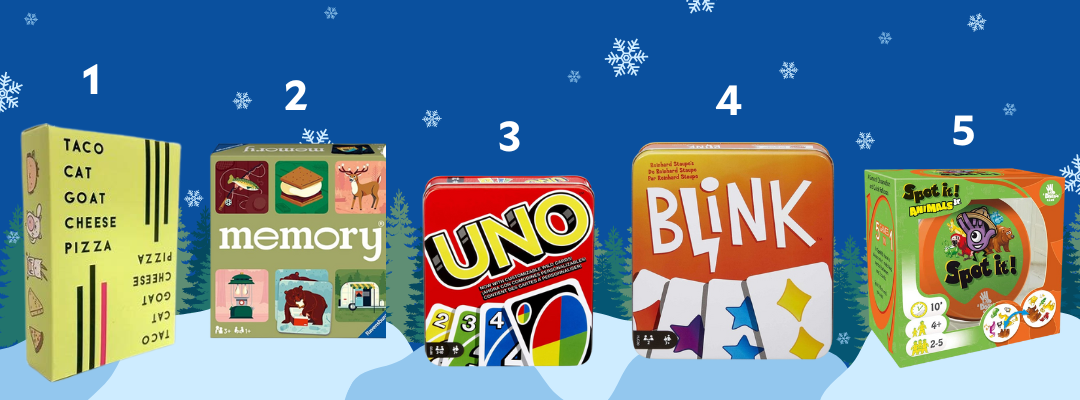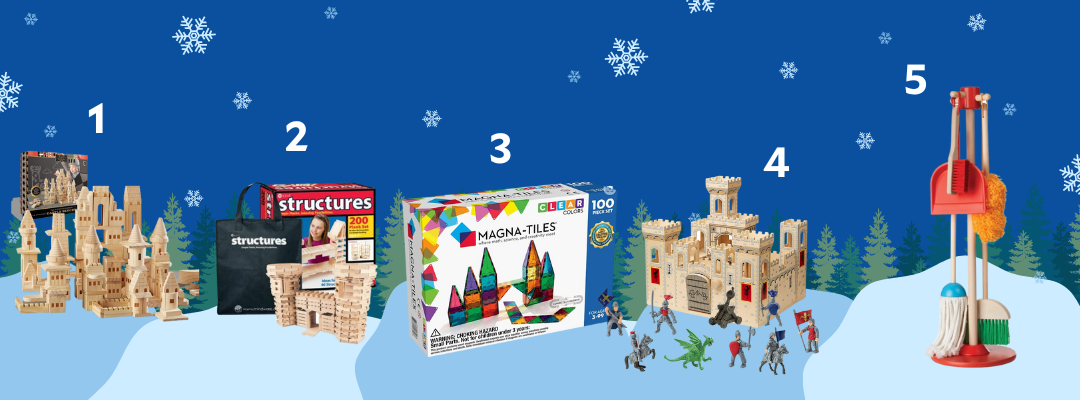Happy holidays from our team at School Literacy & Culture! With the holiday season comes shopping for the perfect gifts for the little ones in your life. This year we have centered our annual gift guide around gifts that promote the development of self-regulation and executive functioning skills in young children. As early childhood teachers, we know self-regulation and executive functioning skills are necessary for a child’s success in school. These are not the cognitive academic skills that teach children how to read and write or add and subtract. But these are the pre-requisite skills that allow children to attend long enough, focus well enough, and concentrate hard enough to acquire the cognitive academic skills taught in the classroom. According to McClelland et al., “Self-regulation is the conscious control of thoughts, behavior, and emotions,” (2010). Executive function skills consist of three distinct skills, cognitive flexibility, working memory, and inhibitory control (Garon, Bryson, & Smith, 2008). When children are able to successfully practice all three of these executive function skills they are able to self-regulate (McClelland et al., 2010).
So, what is cognitive flexibility, working memory, and inhibitory control? And what does practicing those skills look like for young children? Let’s take a look at a formal definition of each of these skills, as well as an example of the skill playing out in an early childhood classroom:
- “Attentional flexibility is the ability to pay attention and focus on a task and the ability to switch attention away from that task when needed,” (Rueda et al., 2005). For young children, practicing cognitive flexibility might look like a child paying attention to a rousing game of tag on the playground, but when they hear their teacher’s “line up bell” ring, they are able to quickly and seamlessly switch their attention to the new task of ending the game of tag and lining up with their classmates. It might also look like a child holding two ideas in their mind at the same time. For instance, if a teacher is calling children to line up, they might say, “If you have brown hair and you are wearing a red shirt, please line up.” A child must think about what color their hair is AND what color their shirt is at the same time… and decide if it is time for them to line up. While this might seem simple for us as adults, developing cognitive flexibility is challenging for young children!
- “Working memory is the ability to mentally hold and process information,” (Gathercole & Alloway, 2008). Here at SLC we often refer to our working memories like a computer hard drive. With a strong working memory, we are able to store information in our minds and pull that information up when we need it, just as a hard drive stores files and pulls up the documents when we need them. For young children, this might look like a child remembering the cardinal directions (because their teacher taught them a mnemonic device to remember them by, “Never Eat Stale Waffles”) when they begin working on a mapping activity and completing it correctly.
- “Inhibitory control is the ability to stop an impulse and select another more adaptive response in its place,” (Dowsett & Livesey, 2000). Inhibitory control might be the executive function skill we think about the most as parents and caregivers. A child practicing inhibitory control is able to stop themselves from shouting out an answer in the classroom and instead raise their hand and wait for their teacher to call on them.
As you can see from these definitions, executive function skills are the skills children need to effectively function at home, school, and beyond. What better gift to give our children than the gift of skills that will serve them for life? All of the gifts on our guide this year encourage executive function skills. You’ll notice we have many game recommendations, as games are one of the very best ways to build cognitive flexibility, working memory, and inhibitory control! The same is true for building materials and pretend play items. These gifts are ripe for supporting turn-taking, patience, and resilience. The books we’ve chosen this year also support the development of executive function skills, cognitive flexibility in particular.
Read on for our suggestions this holiday season. We wish you a cozy, peaceful, and joy-filled holiday season with those you love most. And please remember, there is no greater gift we can give our children than our time, so soak up the precious moments and play these games, read these books, and build with these blocks WITH your children!
Board and Tabletop Games

Card Games
Also recommended: Card holder for little hands

Independent Strategy Games

Pretend Play and Building
- FAO Schwartz Castle Blocks
- Keva Plank Blocks
- MagnaTiles
- Melissa & Doug Deluxe Castle & Knights and Dragons Toob
- Melissa & Doug Let’s Play House Set

Books
- If… by Sarah Perry
- Blueberries for Sal by Robert McCloskey
- They All Saw A Cat by Brendan Wenzel
- What If You Had Animal Parts?! Series by Sandra Markle
- The Girl Who Never Made Mistakes by Gary Rubinstein

The Susanne M. Glasscock School of Continuing Studies and School Literacy & Culture wishes you and yours a joyous, peaceful holiday season and a very happy new year!
References:
Dowsett, S.M. and Livesey, D.J. (2000). The development of inhibitory control in preschool
children: Effects of “executive skills” training. Dev. Psychobiol., 36: 161-174. https://doi.org/10.1002/(SICI)1098-2302(200003)36:2<161::AID-DEV7>3.0.CO;2-0
Gathercole, S., & Alloway, T. (2008). Working memory & learning: A practical guide for
teachers. London: SAGE Publications Ltd.
McClelland, M., Cameron Ponitz, C., Messersmith, E., & Tominey, S. (2010). Self-regulation:
The integration of cognition and emotion. In R. Lerner (Series Ed.) & W. Overton (Vol. Ed.), Handbook of lifespan development: Cognition, biology, and methods (Vol. 2, pp. 509-533). Hoboken, NJ: Wiley.
McClelland, M. & Tominey, S. (2016). Stop, think, act: Integrating self-regulation in the early
childhood classroom. New York: Routledge.
Rueda, M.R., Rothbart, M.K., McCandliss, B.D., Saccomanno, L., & Posner, M.I. (2005).
Training, maturation, and genetic influences on the development of executive attention. Proceedings of the National Academy of Sciences, 102, 14931-14936.

